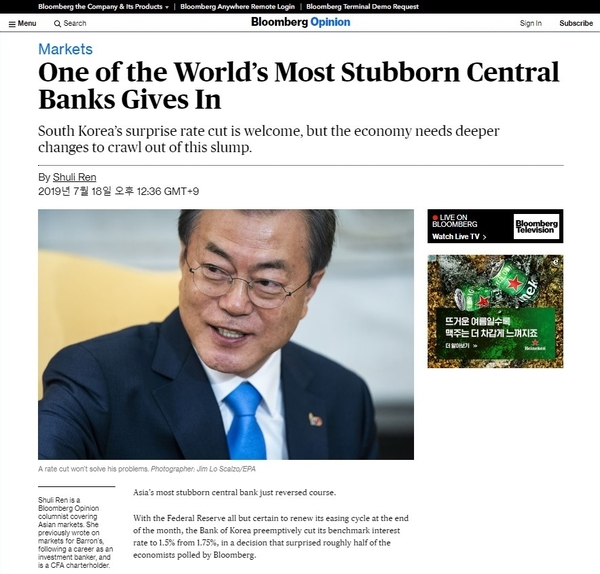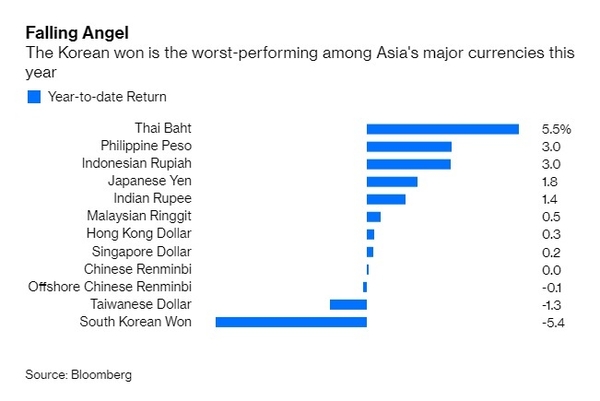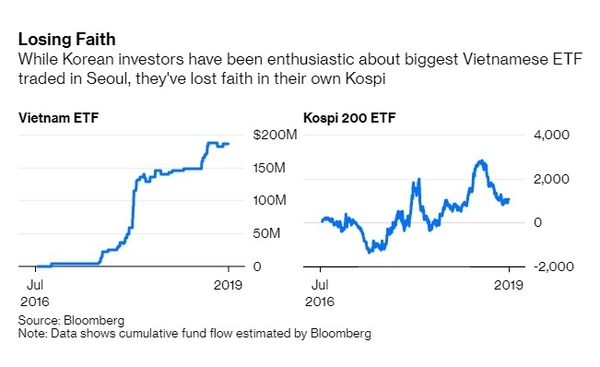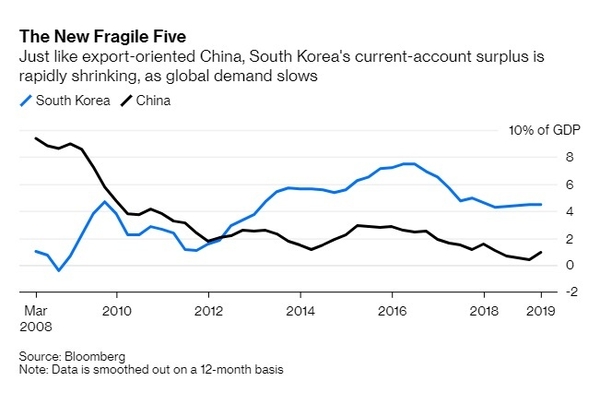[편집자주] 아래 칼럼은 ‘블룸버그 오피니언 칼럼니스트(Bloomberg Opinion Columnist)’인 슐리 렌(Shuli Ren)이 작성한 것으로, 블룸버그의 편집부(editorial board)나 본사(Bloomberg LP), 사주(owners)의 입장을 반영하는 것은 아닙니다. 이점 유의 바랍니다. (2019.9.16.) |

중앙은행의 목표는 시장의 안정이다 : 한때 ‘아시아의 호랑이(Asian Tiger)’였던 한국은 현재 ‘개집(doghouse)’ 신세다. 한국의 주식 시장이 파키스탄 다음으로 나쁜 성적을 내는 동안, 원화는 올해 달러기준으로 5.4%나 하락했다(The central bank aimed to calm markets: Once an Asian Tiger, South Korea is now in the doghouse. The Korean won has tumbled 5.4% this year, while its stock market is the region’s second worst-performing after Pakistan, on a dollar basis).

하지만, 한국은 외부요인 문제보다 내부요인 문제가 더 심각하다. 지난 2년간, 문재인 대통령의 사회주의적 실험은 한국 경제의 ‘야성적 충동(animal spirits)’를 죽여버렸다. 문재인의 재임기간 동안, 소비자 지수가 10년만에 최저점으로 내려갔다. 일부 시민들(한국인들)은 삼성전자나 롯데그룹과 같은 대기업을 따라 배트남으로 이주했다. 심지어 주식 투자자들도 한국에 대한 투자보다는 동남아시아 지역에 대한 투자를 선호했다(But the country’s problem runs much deeper than external factors. In the past two years, President Moon Jae-in’s socialist experiments have sapped the animal spirits from this once-vibrant economy. During his rein, consumer confidence fell to a decade low. Some citizens have moved to Vietnam, alongside conglomerates such as Samsung Electronics Co. and Lotte Corp. Even stock investors have preferred to place their bets with the Southeast Asian country).


자본유출을 막기에는 늦었을지도 모른다. 작년에 한국인은 호치민시의 값비싼 콘도를 22%나 구매하면서 베트남인과 중국인 다음 순위를 기록했다. 문 대통령의 서울 부동산 정책은 지나친 개입으로 보인다. 반면에, 한국은행은 손발이 묶였다. 올해 아시아 통화가치 성적표를 살펴보자. 경제학 교과서의 이론과는 반대로, 인도네시아와 인도같은 경상수지 적자국들의 통화가치가 양호한 반면에, 중국, 한국, 대만과 같은 경상수지 흑자국들의 통화가치가 뒷걸음치고 있다(It may be too late to avoid a capital exodus. Last year, Koreans were the third-biggest buyers of Ho Chi Minh City’s luxury condos, comprising 22% of sales after Vietnamese and Chinese purchasers. President Moon’s property tightening in the capital city of Seoul was seen as heavy-handed. Meanwhile, the Bank of Korea’s hands are tied. Take a look at how Asian currencies are performing this year. Upending textbook economics, deficit countries such as Indonesia and India are doing just fine, while current-account surplus economies such as China, South Korea and Taiwan are on the back foot).
ⓒ 미디어워치 & mediawatch.kr